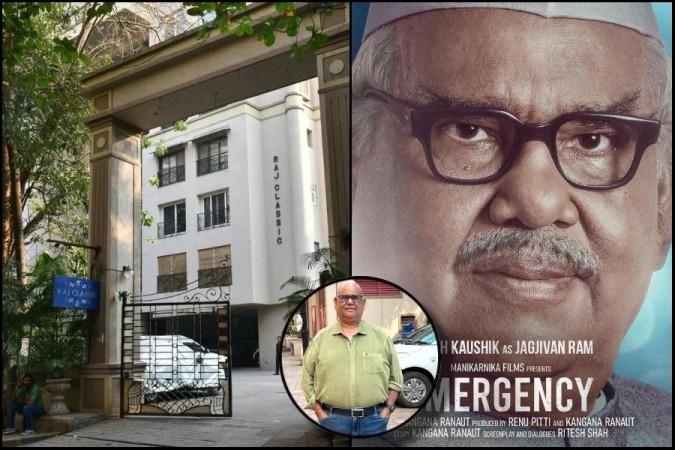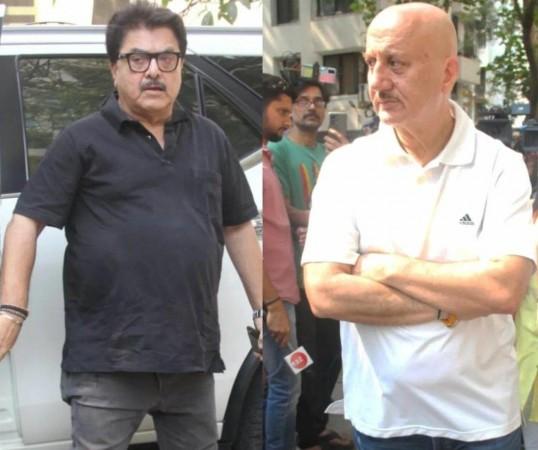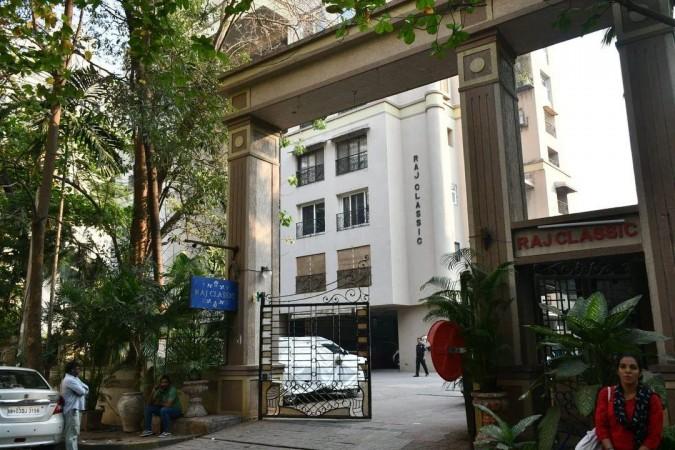Bollywood actor-filmmaker Satish Kaushik's untimely demise has sent shockwaves to the nation. As per reports, the maverick director and actor breathed his last in the wee hours of Thursday, March 9. As per various media reports, the actor, aged 66 was in Delhi when he suffered a heart attack while travelling in a car.

Satish Kaushik died due to a heart attack in Gurugram, confirmed his close friend and colleague Anupam Kher
As per reports in Indianexpress.com, Satish Kaushik's close friend and colleague Anupam Kher said, "Satish Kaushik was visiting someone in Gurugram when his health deteriorated and he suffered a heart attack in a car."
Satish's close friend actor-director Anupam penned a heartbreaking note on his dear friend and actor-director's demise. "I know "death is the ultimate truth of this world!" But I never thought in my dreams that I would write this thing about my best friend #SatishKaushik while alive. Such a sudden full stop on a friendship of 45 years!! Life will NEVER be the same without you SATISH! Om Shanti!"

Satish Kaushik's mortal remains are to be bough to Mumbai by 3 PM today
As per reports in ETimes, the actor's mortal remains will be flown to Mumbai from Delhi via air ambulance at 3 pm. Some close friends and family members of Satish rushed to Delhi as soon as the news broke and made quick arrangements for the autopsy to be conducted and the mortal remains to be carried home as soon as possible. His friends and family are expected to land in Mumbai by 4 pm.
Delhi | Post-mortem of actor Satish Kaushik is over. The initial report suggests no injury mark was found over the body. Reports stated cardiac arrest as the cause of death of the actor: Sources pic.twitter.com/h61GMBagN4
— ANI (@ANI) March 9, 2023
Satish Kaushik's mortal remains has left from DDU hospital Delhi [visuals]
Celebrities have reached Satish Kaushik's Mumbai residence



His impeccable body of work
The actor and director has left behind a legacy of some brilliant work. These include directing the blockbuster Tere Naam, starring Salman Khan, and Anil Kapoor-Sridevi starrer Roop Ki Rani Choron Ka Raja, and starring in a slew of movies such as Jaane Bhi Do Yaaron, Mr. India, Saajan Chale Sasural and most recently, Sharmaji Namkeen, Thar and Chhatriwali.
Satish Kaushik will be seen in Emergency
However, the actor will be seen one last time in Emergency, directed by Kangana Ranaut. In September last year, Kangana took to her Instagram and revealed that Satish Kaushik will be seen playing the role of the late defence minister Jagjivan Ram. Jagjivan was also a freedom fighter who played the role of late Defence Minister Jagjivan Ram in the historical drama, centred around the troubled period of India's Emergency in 1975-76, during Indira Gandhi's tenure as Prime Minister. Jagjivan Ram was also a freedom fighter.
Satish Kaushik was hale and hearty during Holi
Satish Kaushik's last post on his official Twitter account was a series of pictures from the annual Holi celebrations organised by noted lyricist-writer Javed Akhtar on March 7 in Mumbai.
Colourful Happy Fun #Holi party at Janki Kutir Juhu by @Javedakhtarjadu @babaazmi @AzmiShabana @tanviazmi.. met the newly wed beautiful couple @alifazal9 @RichaChadha.. wishing Happy Holi to everyone ??????? #friendship #festival #Holi2023 #colors pic.twitter.com/pa6MqUKdku
— satish kaushik (@satishkaushik2) March 7, 2023
Satish wrote, "Colourful Happy Fun #Holi party at Janki Kutir Juhu by @Javedakhtarjadu @babaazmi @AzmiShabana @tanviazmi.. met the newly wed beautiful couple @alifazal9 @RichaChadha .. wishing Happy Holi to everyone #friendship #festival #Holi2023 #colors."
Celebs, fans and Indian politicians pay heartfelt tribute
Brilliance, goodness & that famous laughter!! Rest in Peace Sir.?
— sushmita sen (@thesushmitasen) March 9, 2023
Satish Kaushik #duggadugga pic.twitter.com/1VzxF9Mj0d
Chanda Mama is gone. Deeply saddened to hear about Satish Kaushik ji’s demise. Will remember him for the spontaneous laughter he brought to the sets of Mr & Mrs Khiladi. Am sure he’s already making everyone smile in heaven. Om Shanti ? pic.twitter.com/8OYsBmSjhd
— Akshay Kumar (@akshaykumar) March 9, 2023
जानता हूँ “मृत्यु ही इस दुनिया का अंतिम सच है!” पर ये बात मैं जीते जी कभी अपने जिगरी दोस्त #SatishKaushik के बारे में लिखूँगा, ये मैंने सपने में भी नहीं सोचा था।45 साल की दोस्ती पर ऐसे अचानक पूर्णविराम !! Life will NEVER be the same without you SATISH ! ओम् शांति! ??? pic.twitter.com/WC5Yutwvqc
— Anupam Kher (@AnupamPKher) March 8, 2023
Kangana Ranaut took to her social media handles and wrote, "Woke up to this horrible news, he was my biggest cheerleader, a very successful actor and director #SatishKaushik ji personally was also a very kind and genuine man, I loved directing him in Emergency. He will be missed, Om Shanti."
Pained by the untimely demise of noted film personality Shri Satish Kaushik Ji. He was a creative genius who won hearts thanks to his wonderful acting and direction. His works will continue to entertain audiences. Condolences to his family and admirers. Om Shanti.
— Narendra Modi (@narendramodi) March 9, 2023
Satish Kaushik is survived by his wife Shashi and daughter Vanshika, who is just 11-years-old.
Satish Kaushik succumbs to heart attack? Early warning signs you must not ignore
A heart attack, also called a myocardial infarction, happens when a part of the heart muscle doesn't get enough blood. The more time that passes without treatment to restore blood flow, the greater the damage to the heart muscle, said Dr Shrey Srivastav, MD (Internal Medicine), Sharda Hospital.
Heart attack signs that you must not ignore
Chest discomfort. Most heart attacks involve discomfort in the center of the chest that lasts more than a few minutes – or it may go away and then return. It can feel like uncomfortable pressure, squeezing, fullness or pain.
Discomfort in other areas of the upper body. Symptoms can include pain or discomfort in one or both arms, the back, neck, jaw or stomach.
Shortness of breath. This can occur with or without chest discomfort.
* Feeling weak, light-headed, or faint. You may also break out into a cold sweat.
* Pain or discomfort in the jaw, neck, or back, in upper abdomen.
* Pain or discomfort in one or both arms or shoulders.
* Shortness of breath. This often comes along with chest discomfort, but shortness of breath also can happen before chest discomfort.
* Excessive sweating.

Foods high in saturated fat include:
- pies
- fried foods
- sausages and fatty cuts of meat
- butter
- ghee (a type of butter often used in Indian cooking)
- lard
- cream
- hard cheese
- cakes and biscuits
- foods that contain coconut or palm oil
Alcohol
If you drink alcohol, do not exceed the recommended limits:
- men and women are advised not to regularly drink more than 14 units of alcohol a week
- spread your drinking over 3 or more days if you regularly drink as much as 14 units a week
Differences between men and women
As with men, women's most common heart attack symptom is chest pain (angina) or discomfort. But women may experience other symptoms that are typically less associated with heart attack, such as shortness of breath, nausea/vomiting, and back or jaw pain.
Prevention
- Don't smoke or vape and avoid second-hand smoke.
- Keep your blood pressure below 120/80 mm Hg.
- Get your cholesterol checked and talk to your healthcare professional about your numbers.
- Eat foods that are low in saturated fat, trans fat, sodium (salt) and added sugars.
- Be physically active.
- Reach and maintain a healthy weight. A normal body mass index is between 18.5–24.9.
- Keep your fasting blood sugar less than 100 mg/dL or an A1C of less than 5.7%.
- Get enough sleep. Aim for an average of 7-9 hours of sleep a day.
- Get regular medical check-ups.
- Take your medication as prescribed.













